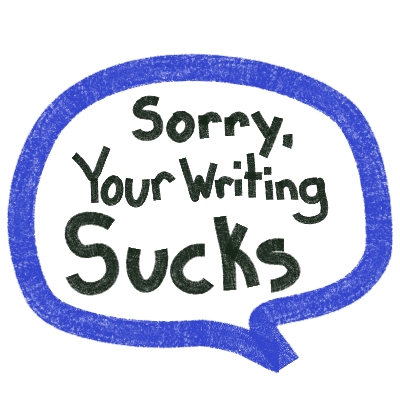Every Friday I go to my writing critique group. It’s a group of 5-12 people who show up fairly consistently to give feedback on each other’s writing. We bring about 4 pages, read aloud, then everyone shares why they think it sucks.
Okay, not really, but that’s the point I want to focus on.
It’s critical for a writer to find people who aren’t afraid to express what they’re feeling while reading your work. The good is always nice to hear so you don’t get discouraged, but in the end it’s mostly useless. Critiquing is all about improving.
When I started looking for critiques, I had attended a different writing group a few times, though it ended up being more of a share-and-support group. People were happy to say they loved my stuff, but I already knew it needed work, and their feedback didn’t allude to that. I knew being in that group wasn’t going to challenge me to be a better writer.
The thing is, people are either afraid to tell you how they think something could be better, or they just turn their brains off and later tell you “it was fine.” You can share with these people, and honestly I would still, as sometimes they can pull out a small nugget of advice, but generally, don’t hold your breath on good feedback. Take what you can get, but don’t waste your time.
My writing critique group is good about picking apart the smaller details. They help me broaden my descriptions, lengthen conversations, give ideas of how something might be funnier, or how a sentence can pack a punch. Because we share only four pages at a time, this is naturally the main kind of feedback we can give. It’s much harder to critique the story as a whole. But what the group can provide is sooo important. My writing has changed and improved so much because they’re not afraid to challenge me to do better. Even if they think what I read was amazing, they’ll put on their thinking caps and push it even further.
You need those people in your life. Just make sure they aren’t people targeting YOU. You and your writing are very separate things. If a person critiques your writing and it becomes a critique of your person, then drop them like it’s hot. They won’t help you. However, that being said, YOU have to learn how to not take critiques of your work personally. If you do, you will either never improve, or you’ll progress very slowly. Everyone is there to make your work better. Never forget that. It has nothing to do with you. And, because writing is a fluid thing, it can be edited and changed until it’s perfect. Get all the bad feedback out before you share it with reviewers who have no qualms in telling you, and the whole world, why your story sucks. Sure, some people are going to dislike your work because their tastes are different; bad reviews are unavoidable. But bad writing IS avoidable.
Also, work hard on finding at least one person who’s really opinionated and who is willing to read the entire story. Getting someone to focus on larger story elements is equally important. This one, right person can influence huge changes to your book. I have a friend that I call my “alpha reader.” He’s usually the only person to read the first draft, and his single feedback can spur a complete rewrite. He’s keen on critical points in a book, and it’s the most valuable advice I can get. If you can find more people, then do so! But, maybe save them for feedback on the next draft, and the draft after that. You don’t want to squander all your best resources on the worst version of your book.
So, if you’re writing a book, go forth and find those right people who aren’t afraid to tell you why something in your novel isn’t working. You can find them on Meetup, you can post an “in search of” page on craigslist, you can spend a small fortune and pay a professional online. Whatever it be, don’t just sit around thinking you’re a great writer. No one is a great writer without people telling them that they’re not. Yet.
Got a thought? Leave a comment. Let’s start a dialogue.

